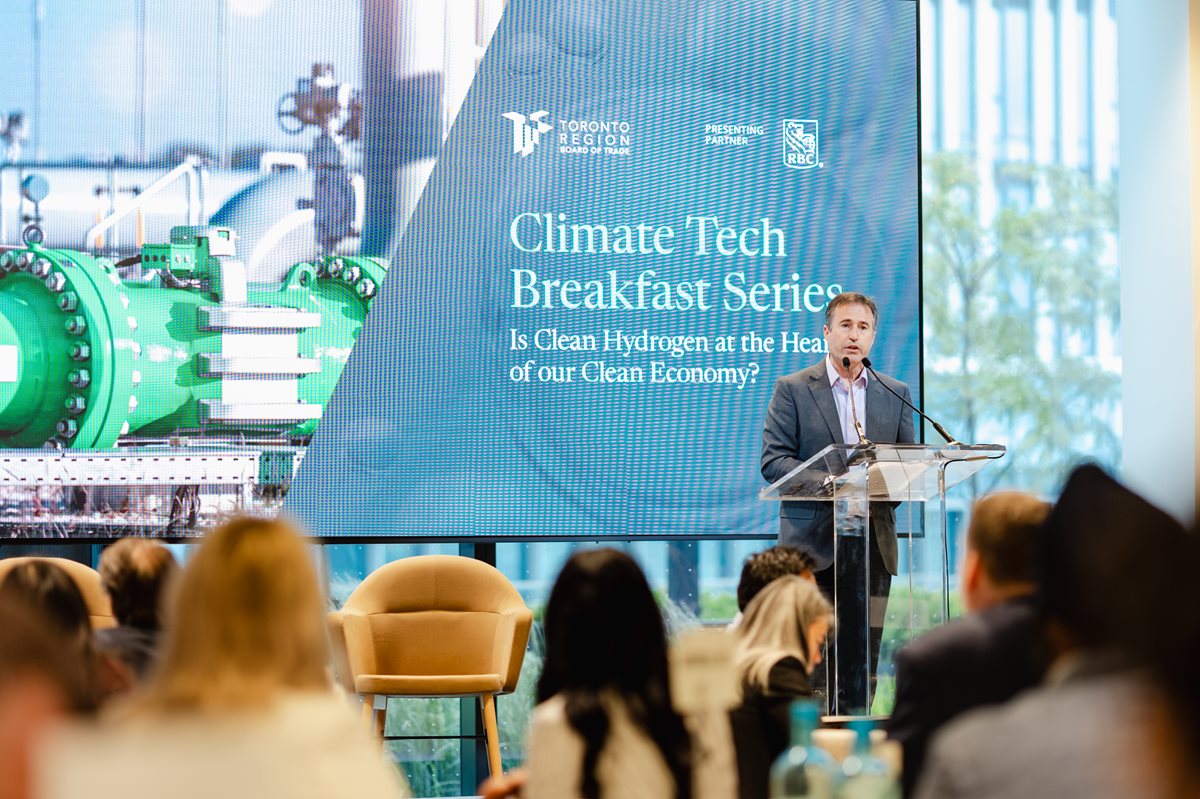
Hydrogen, the smallest molecule in the universe, holds immense promise for revolutionizing our path to net-zero. At our recent Climate Tech Breakfast, experts were emphatic: hydrogen's time has come, positioning Canada as a leader in this transformative movement. This event, the second of our three-part Climate Tech Breakfast Series, focused on hydrogen as a pivotal climate technology where Ontario has a competitive edge.
David Campbell, the Board’s Associate Vice President of Policy and Research, set the stage by highlighting the transformative potential of hydrogen. Campbell pointed out that while the closure of Ontario’s coal power plants was a landmark achievement, hydrogen promises to deliver even more profound benefits. Hydrogen not only matches but can surpass the impact of coal plant closures by enabling deeper emissions cuts across multiple sectors.
Hydrogen's journey from a futuristic concept to a forefront energy solution was a recurring theme. John Stackhouse, Senior Vice President at RBC, highlighted both the progress made and the challenges ahead. "It's impressive from our point of view to see what both the federal government and several of the provinces are at least aspiring to do, and we all have to work together to keep that momentum going and to turn that into real action and real investment. But as we all know, we've got a very, very long road ahead, and in some ways, it's a steep road. Just a couple of facts to share with you to set the conversation. Canada must scale low-carbon hydrogen production by a factor of 1000X."

Stackhouse emphasized the tangible advancements in hydrogen infrastructure and technology. "Fortunately, the good news is there are plenty of pilot projects and early deployments that many of you are part of that are demonstrating the potential in the real economy of hydrogen. Key applications highlighted by the progress update include blending with natural gas for space heating and power generation, and hydrogen fuel for transportation."
Hydrogen’s transformative impact on transportation, particularly along the heavily trafficked 401 corridor, was a significant focus. Ivette Vera-Perez, President and CEO of the Canadian Hydrogen Association, highlighted, "The highway 401 corridor is one of the highest-polluting transport corridors in America and certainly the highest-polluting in Canada. Lots of traffic on the 401, approximately 10,000 trucks a day, $380 million in goods being moved. If we transition 10,000 trucks from diesel to hydrogen fuel cells, that would equate to 3,000 tons of CO2 saved per day."
Heather Eggleston, Vice President of Low Carbon Solutions at Imperial, elaborated on hydrogen's potential to meet net-zero goals. "The smallest atom in the universe could represent a major opportunity for both our individual and collective net-zero goals. When it comes to low-carbon hydrogen, we're looking to build out in a matter of a few short years what took other technologies really decades, or centuries to establish. But I'm here to tell you that Imperial is up for the challenge."

Hydrogen's advantages where electrification is challenging were also discussed. In sectors like heavy-duty transportation and industrial processes, direct electrification often falls short due to technical limitations or economic impracticalities. Cara-Lynne Wade, Director of Energy Transition at Enbridge Gas, noted, "For Enbridge, hydrogen represents an emission-free energy supply that can lower our customers' carbon emissions while also allowing us to support maintaining a reliable, safe, and cost-effective energy system now." Wade emphasized hydrogen can effectively complement and enhance existing energy systems in these hard-to-electrify areas, providing a versatile solution for achieving deeper emissions reductions.
Finally, Raveel Afzaal, President and CEO of Next Hydrogen, underscored the global and economic potential of hydrogen. "If you look at it globally, we had about 200 megawatts of electrolyzers installed on a cumulative basis at the beginning of this decade. Now we're talking about close to 100 gigawatts by 2030 alone."
While the promise of hydrogen is clear, significant challenges remain, particularly in scaling production and infrastructure. Ontario's abundant clean electricity and robust industrial sector provide a solid foundation for this growth. The purpose of this event was to continue advancing the conversation, driving towards a cleaner, more sustainable future.
Our Climate Tech Breakfast series continues this fall when we ask, Can Nuclear Technology Superpower Ontario's Cleantech Economy? Join us in September as we explore how to maximize the economic opportunities of our expanding nuclear industry.
Thank you to our partners who made this event possible.


